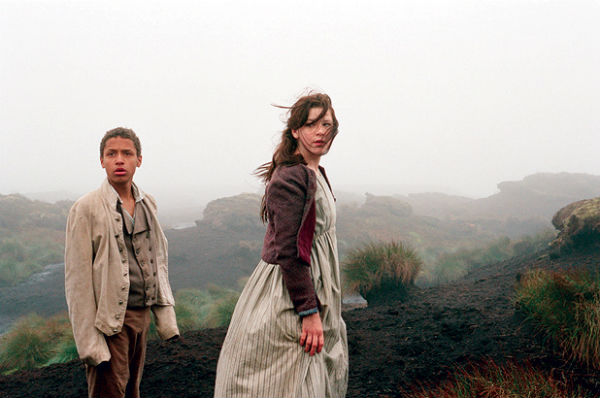Wuthering Heights
15Even if English literature isn't your thing, the chances are you've heard of the Brontė sisters. Charlotte's most famous work is probably Jane Eyre, and sister Emily's is Wuthering Heights.
If you want a decent trivia to confound your know-it-all friends ask them how them how many other novels Emily published. The answer is none: Wuthering Heights was her only published novel. For a bonus trivia point you could also add that it was written under the pseudonym Ellis Bell.
Pointless facts aside, both novels have seen their fair share of adaptations for the screen, both big and small, with last year alone producing film versions of both. The problem must crop up however, of how to bring something new to often told stories such as these.
This one, directed by Andrea Arnold (Fish Tank), comes at it from a pretty stylised approach, with little need for the likes of dialogue.
On his way home one day, Mr Earnshaw (Paul Hilton) comes across a poor, cold wretch wandering the moors. Being an upstanding Christian man, he decides to adopt the young boy and names him Heathcliff (Solomon Glave).
Although the rest of his family doesn't take too well to the latest member of their family, Heathcliff strikes up a friendship with his young daughter Catherine (Shannon Beer). They spend a lot of time in each other's company, often walking around the countryside together.
One day they venture further away and come across the Linton family. Although a seemingly meaningless act, it has long-lasting repercussions on their relationship. Catherine almost starts her road to womanhood from that point on, particularly after meeting young Edgar Linton.
When Heathcliff is belittled by Catherine in front of Edgar, he runs away from Wuthering Heights.
Some years later and Heathcliff (James Howson) returns, looking far more like a gentleman and with coin in his pocket to boot. He has returned to see his Catherine (Kaya Scodelario), and although their feelings for each other haven't changed, their circumstances have.

Is that really a 20 foot tall Kate Bush following us?!
It doesn't take long before it's more than evident that Arnold's version is attempting to be über indie cool. Exhibit A? Shooting in 4:3 ratio. This means that the screen size takes on an old school square appearance, sniggering as it does at its modern widescreen chum. Now Arnold may well prefer to shoot in 4:3, but modern tellies certainly don't like the look of it. Considering the very visual feel of the film that she goes for, it's a curious choice to go for a very uncinematic look. However interesting her shots are, they're framed in something decidedly ugly.
And although the feel of the film is certainly important to her, dialogue certainly isn't. Words are just as barren as the sparse locations used.
It's no surprise that Channel Four helped fund the project as there's more than a little This is England 1771 about it this feature. That, crossed with a Brontė version of Skins without the sex and drugs. The irony is of course that Scodelario is a Skins alumnus, so it's probably quite fitting.
Ultimately though, Arnold spends far too much precious time framing shots just right at the expense of story. She attempts to imbue her version of this classic with a gamut of emotions, but she misses out one key ingredient: passion.
Arnold's version is so desperate to be seen as stylish and trendsetting, that she loses focus of the main relationship between her two protagonists. Yes they brood well (particularly the younger couple who should get far more praise than their elder counterparts for all the solid ground work they put in), but the result is more emoting with serious pouts and determined gazes and less acting. You could take frames out and they'd make a great shoot for a trendy magazine, but as a whole it leaves a chilled and distant impression.
The film also has no soundtrack as such (although it does end with a track from the on trend Mumford and Sons for its closing credits), which was clearly a ploy to increase the theme of isolation, which it does, but sadly it also helps to isolate the viewer from the bare scenes on screen.
With what is supposed to be one of the greatest love stories ever told, this film simmers with the intensity of a bar of soap.
This version, despite its pretences, certainly could have benefited from a stronger script, but even that would have been only one step in the right direction, and several more would have been needed. As it stands, Arnold's adaptation doesn't quite reach the dizzying heights it thinks it reaches.
